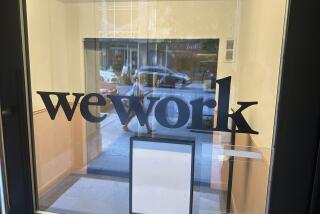Computer Firm MAI Files for Bankruptcy Protection : Debt: Software publisher and maintenance concern says the move is precautionary to allow it to reorganize.
After about four years of redefining itself as a software publisher and computer maintenance concern, MAI Systems Corp. filed for bankruptcy protection Monday.
The 22-year-old company, which is controlled by New York financier Bennett S. LeBow, said the bankruptcy filing was a precautionary move to let it reorganize its business.
Ian Gilson, an analyst at the investment bank L.H. Friend, Weinress & Frankson Inc. in Irvine, said the filing had long been expected.
In mid-November, MAI announced it was in default on $77 million in debt, shortly after the European investment firm Candover backed out of an agreement to buy MAI Systemsâ Austrian, German and Swiss operating units for about $100 million.
Subsequently, MAI had been negotiating with its U.S. and Canadian lenders for forbearance on its secured debt. Last month, it announced that its lenders would assume control of MAIâs European subsidiaries in exchange for canceling $84 million in debt. Earlier this year, MAI moved its headquarters from Tustin to Irvine.
Despite the reduction, MAI said it believes that the filing was necessary to continue operating while it whittles down the remaining debt, said Robert L. Faulkner, senior vice president of operations.
âIt was necessary for us to take this action to get a stable environment and to keep this matter from diverting the attention of management,â he said.
The filing was made in U.S. Bankruptcy Court in Wilmington, Del., where MAI is legally incorporated. MAI listed assets of $26.1 million and liabilities of $145 million as of March 23. MAI employs about 1,000 employees, down from a peak of about 4,000 during its heyday in the late 1980s.
Founded as Basic Four Corp. in 1971, the company was renamed several times. LeBow put up $5 million of the $105 million used to buy the company from Asher B. Edelman in 1985, and Drexel Burnham Lambert provided the remaining financing. The company went public in 1986.
MAI was making minicomputers, which can control the operations of a business but are not as large or fast as centralized corporate computers called mainframes.
MAI tried for 10 months in 1988 and 1989 to acquire a rival minicomputer manufacturer, Prime. The effort failed, and MAI, saddled with debt from LeBowâs leveraged buyout, made some crucial missteps in trying to keep up with technological change.
The company invested in its proprietary minicomputers, those that run only one brand of software. The rest of the industry began investing in open-systems machines, which run standardized software.
Beginning in 1990, the company tried to shift from manufacturing minicomputers to publishing software for particular industries and maintaining a variety of computers. MAI targeted its software to particular industries: manufacturers, hotels, wholesale distributors, credit unions, finance companies and transportation companies, among others.
Analysts said the effort came too late, and the company got caught in the transition. The recession and increased competition from personal-computer manufacturers began to take its toll: For its last four fiscal years ended Sept. 30, MAI reported combined losses of $366.8 million.
MAI reported a loss of $186.8 million, or $5.75 a share, for its fiscal year ended Sept. 30, compared to a loss of $75.8 million, or $2.41 a share, a year earlier. During the fiscal year, the company laid off more than 564 employees, and it gave up an estimated 1,500 in March when the banks acquired control of the European subsidiaries.
âThey never really recovered from the abortive effort to take over Prime Computer,â said Gilson of L.H. Friend.
âFor years, MAI has reminded me of a three-legged camel wandering through the desert,â said Mark Matheson, analyst at investment bank Crowell, Weedon & Co. in Los Angeles.
Faulkner said the companyâs efforts to shift gears werenât hopeless, but he did not offer a strategy for recovery. He said the companyâs North American business is profitable.
âWeâve done well at reducing our expenses and our debt,â he said. âEveryone knows the industry we are in is difficult, and no one has been immune from the rapid change and pressures on profit margins.â
The filing is a setback for financier LeBow. MAI Systems is 82.3% owned by BGLS Inc., a unit of Brooke Group Ltd., a New York company controlled by LeBow.
LeBow was a flashy financier who also tried to build a financial empire with investments in tobacco, sports and entertainment companies. His Brooke Group also holds majority interests in cigarette maker Liggett Group and SkyBox, a trading-card company.
MAI Systems listed its three largest unsecured creditors as Los Angeles-based Chemical Trust Co. of California, the trustee for $40 million in bonds paying nearly 12% interest that are due in 1996; Bell Atlantic Business Services of Frazier, Pa., owed $4 million, and Hewlett-Packard Co.âs subsidiary in Pasadena, owed $1.5 million.
A creditors meeting has been set for June 11, Faulkner said. The filing does not apply to the companyâs Canadian and Latin American software subsidiaries, Faulkner said, nor does it apply to its CLS Inc. hotel computer software subsidiary in Long Beach. The Long Beach unit has 130 employees.






